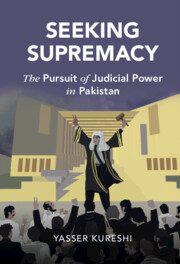Book contents
- Seeking Supremacy
- Cambridge Studies in Law and Society
- Seeking Supremacy
- Copyright page
- Dedication
- Contents
- Figures
- Tables
- Acknowledgements
- Introduction
- Chapter One The Judiciary, Rule of Law and the Military
- Chapter Two The Loyal Court (1947–1977)
- Chapter Three The Controlled Court (1977–1999, Part 1)
- Chapter Four Between the Barracks and the Bar (1977–1999, Part 2)
- Chapter Five The Confrontational Court (1999–2017)
- Chapter Six Epilogue
- Chapter Seven Conclusion and Comparative Perspectives
- Appendix: Structure of the Pakistani Judiciary
- References
- Index
- Cambridge Studies in Law and Society
Chapter Six - Epilogue
A Judiciary Fragmenting?
Published online by Cambridge University Press: 08 September 2022
- Seeking Supremacy
- Cambridge Studies in Law and Society
- Seeking Supremacy
- Copyright page
- Dedication
- Contents
- Figures
- Tables
- Acknowledgements
- Introduction
- Chapter One The Judiciary, Rule of Law and the Military
- Chapter Two The Loyal Court (1947–1977)
- Chapter Three The Controlled Court (1977–1999, Part 1)
- Chapter Four Between the Barracks and the Bar (1977–1999, Part 2)
- Chapter Five The Confrontational Court (1999–2017)
- Chapter Six Epilogue
- Chapter Seven Conclusion and Comparative Perspectives
- Appendix: Structure of the Pakistani Judiciary
- References
- Index
- Cambridge Studies in Law and Society
Summary
Ten years after the high point of judicial assertiveness in 2007, 2017 was another critical juncture in the evolution of Pakistan’s judiciary. In this chapter, I briefly discuss the messy politics of the judiciary since 2017, as it has both contributed to, and been compromised by, autocratization processes in the country. First, I will briefly discuss the trajectory of relations between the judiciary, military and political leadership during this period, as a new, more authoritarian political structure emerged. The military is once more in a position of political dominance, but the de jure leadership of the state lies with an elected political party, the Constitution remains unsuspended and unamended, and the superior judiciary retains its authority and broad jurisdiction. The judiciary itself appears polarized: divided over its role and relationship with other state institutions.
- Type
- Chapter
- Information
- Seeking SupremacyThe Pursuit of Judicial Power in Pakistan, pp. 220 - 237Publisher: Cambridge University PressPrint publication year: 2022

